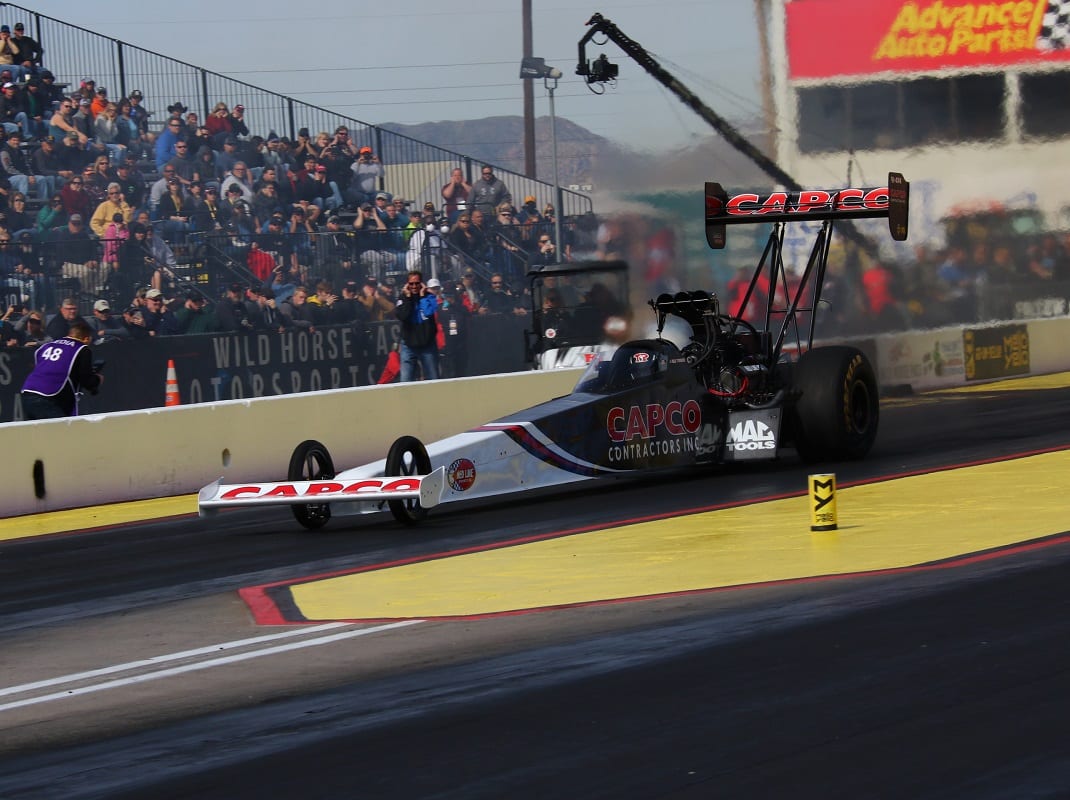Steve Torrence might be a little late to the party, but he’s there.
The reigning NHRA Top Fuel champion, who has raced with a stubborn fury that rivals or surpasses anything drag racing’s legends have dished out, has learned that dominance is necessary only at the right time.
Others already had caught on to that strategy, trying to maneuver their way through NHRA’s six-race, end-of-season Countdown to the Championship playoff.
Torrence, the plain-talking Texan, was blunt about his disdain for the format he regards as socialistic. And he has a powerful ally in the creative three-time champion Antron Brown, who has a clever and rational idea for the sanctioning body to consider.
The Countdown began in 2007 and was patterned after NASCAR’s Chase. The purpose was to maintain fan interest until the final day of the season.
That has happened with Brown, Erica Enders, Brittany Force, John Force, Matt Hagan and Tony Schumacher among those who have clinched series titles in dramatic fashion.
For more than a decade, the top 10 in each professional class after an 18-race so-called “regular season” duke it out in a six-event run. Points are bunched in 10-point increments, with the leader having a 20-point advantage.
As if NHRA drag racing wasn’t complicated enough, the inaugural version of the Countdown in 2007 was a bit over structured and restrictive. The field featured only the top eight drivers after a 17-race regular season. The number of title-eligible racers shrank to four with two events remaining. Drivers’ points were reset in 10-point increments for the first round of the playoffs and again in 10-point increments for the two-race showdown.
The traditional point system didn’t guarantee the driver with the most victories throughout the year would earn the championship. Surprisingly, 16 times among the professional categories from 1974 through 2006, the final year under the “old” format, the champion didn’t win the most races.
Torrence spoke out about the Countdown format in 2017 after he won eight times but lost the championship to Brittany Force.
“It is what it is,” Torrence said. “This whole NHRA deal with the welfare points system is just a crock of crap. You come out here and race for 24 races and you only get to count six. Brittany got hot in the last few races and did good, and you can’t take that away from them. But those guys wouldn’t even be in contention if it wasn’t for this bullshit points system they’ve got. So it is what it is and we’ve got to play by their rules. Congrats to Brittany. Great job. She won the championship. It is what it is, but it’s still bullshit.”
Curiously, in the Countdown-era alone, it had happened seven times before Torrence lashed out.
The most classic example came 10 years ago and inspires hopefuls today. Robert Hight, who had seven first-round losses and two failures to qualify in the 2009 regular season, came from 10th place with three Countdown triumphs to grab his first of two Funny Car championships.
“Robert Hight won the championship from the 10th spot once, but if it was the old, natural way, he would never have been close to winning the championship that year,” Brown said. “What it did is took away from all the teams all their work. I feel like our sport was truly better the old, natural way. That’s my own personal opinion.”
He expressed the same sentiment about Torrence’s disappointment in 2017.
“We race out here. That’s what we do — we race hard,” he said. “Steve and that Capco team worked hard. They won more races than anybody and they deserve the championship. They worked real hard and nobody else would be even close.”
Torrence was so perturbed about losing the title that had appeared to be his that he mule-stomped everyone last season. He was perfect in 11 final rounds and swept all 24 elimination rounds of the Countdown to secure the championship.
Brown understood.
“The regular season is one thing, but the bad part is you really don’t get anything for doing good in the regular season. You’ve got six races to win a championship,” Brown said. “And everything that we’ve done for the last 18 races means nothing. It means nothing. All we did was just seed you.
“We went through a precursor, and all that hard work has gone out the window. And I hate it, because I’m an old-school man where I think all the points should count. Everybody races, and everybody knows this going in. Whoever gets hot for these six races is going to bring the championship home,” he added.
